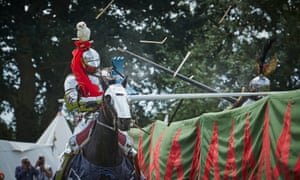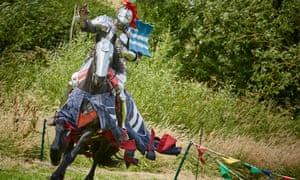There is far more to it than two armoured horse riders hurtling towards each other with 12ft lances. Jousting demands levels of athleticism, agility and equestrianism that make it an ideal candidate for the Olympics, English Heritage argues.
The organisation has launched a campaign to get jousting recognised as an Olympic sport in time for Tokyo 2020.
“We are being deadly serious,” said Lucy Hutchings, English Heritage’s head of projects. “It is an incredible spectator sport, a really fascinating thing to watch. The skill of the knight and the horses make it a great thing to witness … we absolutely believe it deserves its place at the Olympic table.”
English Heritage has held preliminary talks with the International Olympic Committee and the Fédération Equestre Internationale, and on Thursday it launches an online petition.
Hutchings said the IOC was in the process of making the Olympic programme more flexible and bringing in a rule that allowed the host nation to make its own proposals for additional events.

Tokyo has been considering skateboarding, climbing and surfing. “If skateboarding can be included then jousting has a good chance,” said Hutchings.
Dominic Sewell, English Heritage’s jousting expert, agreed. “Given what sports have been submitted to the Olympics over the years, I don’t think there is any reason that something which has been a sport for over a thousand years should not be considered.
“If the sport organises itself, there is no reason why we could not be ready for Tokyo.”
Sewell said jousting, which requires “a huge amount of skill and involves a daily training regime”, ticked lots of Olympic boxes. “You have to be strong, not just physically but mentally, so you can sit fearlessly in your saddle, face your rival and offer yourself as a target.”
Just like dressage, it also requires an enormous amount of equestrian training. Horses must be persuaded to accept a rider dressed in 20kg of steel armour and to gallop at an opponent at speeds of up to 30mph.

“Horses being prey animals, they are naturally designed to run away from things, so to persuade it to run towards another large clanging thing at speed takes time,” Sewell said. He added that jousting should be seen as England’s first national sport.
Jousting’s heyday was in the 15th and 16th centuries, with Henry VIII one of its most famous advocates. Historians have recently speculated that the reason Henry became such a cruel and petty tyrant is that jousting injuries brought about a change in his personality.
The Olympics have a history of accepting new sports, including beach volleyball in 1996, and golf and rugby sevens in Rio de Janeiro this year. Baseball was added in 1998 but taken out after 2008.
English Heritage said jousting was a popular sport not only in England, and not only at the castles where it will this summer be organising jousting events.
Tournaments were held from Belgium to New Zealand, it said, and jousting was recognised as a sport by a number of US states. It has been Maryland’s official sport since 1962.
English Heritage tournaments often feature knights from all over the world, said Hutchings, although she admitted skills were particularly high in the UK. “We’d have a very good chance of doing well [in the Olympics], I think.”
The petition was launched as Team GB prepares to head to this year’s games in Rio. Anyone who cannot wait until Tokyo 2020 to watch some jousting should go to Framlingham Castle in Suffolk this weekend.
Other events will take place later in the summer at Pendennis Castle in Cornwall, Carisbrooke Castle on the Isle of Wight and Bolsover Castle in Derbyshire.



